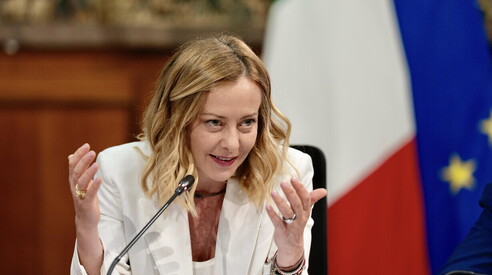Open Arms, Democratic Party administrators under investigation, and the Almasri case: the judicial spectre looms within FdI.


The case
Fazzolari's theories on the Prosecutor's Office's appeal to the Supreme Court against Salvini, Bignami's conspiracy theories on the Milan investigations, and Nordio's fears about the Libyan torturer: this is how suspicions and conspiracies are spreading within Meloni's party.
The Open Arms case is facing doubts at the Supreme Court. The investigations rocking Milan, Turin, and the Marche region are even more complex and at times revealing conspiracy theories: the Schlein-leaning judiciary is taking action against the reformist Democratic Party, which isn't opposed to the separation of careers. In the background, the Almasri case could bring unpleasant surprises to the government when it emerges from the ministerial tribunal. Thus, the Brothers of Italy party finds itself navigating the justice issue against the grain 24 hours after the green light for the first reading of the constitutional bill. It's difficult to find a common thread linking these three seemingly disparate cases. Yet the widespread feeling within the government is that the parliamentary process of separating careers will provoke a reaction from the judiciary. Will this be the case? Reading the latest dossier compiled by the tireless Senate research office of the Brothers of Italy (FdI)—a think tank very close, indeed almost snug, to Undersecretary Giovanbattista Fazzolari—the climate between the judiciary and the majority is not the best. The latest FdI briefing concerns the Palermo Prosecutor's Office's appeal of Matteo Salvini's acquittal in the Open Arms trial. The appeal, the document states, was presented "in a completely irregular manner directly to the Supreme Court of Cassation, which last February ordered the government to compensate migrants in the Diciotti ship case, stating that the disembarkation ban cannot be considered a 'political act exempt from judicial review.'" The dossier by Meloni's party, in addition to demonstrating a sympathy for Salvini already expressed by the prime minister on social media, delves into the merits of the appeals mechanism. And here, further shadows are cast on the Supreme Court of Cassation. "The prosecutors are clearly convinced of their own reasons, also thanks to the order issued in February 2025 by the Joint Civil Sections of the Supreme Court of Cassation on the similar Diciotti ship case. The Supreme Court held that the disembarkation ban imposed by then-Interior Minister Matteo Salvini could not be considered a 'political act exempt from judicial review' and that it was 'in conflict with international law,' in addition to violating Article 13 of the Constitution, which establishes the inviolability of personal freedom." The Prime Minister's party calls the accusations by the Palermo prosecutor's office against the League leader "surreal," and so far, nothing new. And he also reiterates, without announcing any legislative action, what Justice Minister Carlo Nordio said regarding the Garlasco case, regarding how "unconventional it is to challenge a full acquittal." Hence the accusation, as can be seen from leafing through the document, of "a surreal relentlessness with an attendant waste of energy and resources." While the clash on this issue, involving NGOs and migrants, seems inevitable, FdI's approach to the investigations into Democratic Party administrators is still different. Galeazzo Bignami, leader of Giorgia Meloni's party in the Chamber of Deputies, offered a new theory the other evening as a guest on "In onda" on La7: "It just so happens that the investigations in Milan, Turin, and Pesaro affect all the elements of the reformist left that are less orthodox than Schlein on the issue of career separation and the CSM, and are the most open to dialogue. If I were to delve a little deeper into conspiracy theories, I'd say this is a warning to those watching, to say that there's no open dialogue on these issues." Bignami was referring to the case that rocked Beppe Sala's administration, the notice of investigation against Matteo Ricci, and the investigation involving the family of Democratic Party MP Mauro Laus. A reconstruction as difficult to prove as it is compelling, yet it reveals the Brothers of Italy's explicit caution toward the judiciary, even when it targets opposing parties. Behind the scenes, there's real concern within the government about the proceedings surrounding the case of Libyan torturer Almasri: the response of the ministerial tribunal to those under investigation, starting with Nordio, is awaited with a healthy dose of pessimism. Amid this jumble of theories, suspicions, and prejudices, a clash with part of the judiciary over justice reform is emerging. Short circuits included. Ballot boxes and courtrooms: nothing new. This is why the Marche region seems to be a crossroads for many issues within the government and the opposition. The Brothers of Italy party will try to strike while the iron is hot, given the Five Star Movement's doubts about Matteo Ricci. Today and tomorrow, Meloni's parliamentary groups will travel to Senigallia for a two-day event focused on Made in Italy with Minister Adolfo Urso. Who knows if the news will prevail.
More on these topics:
ilmanifesto





